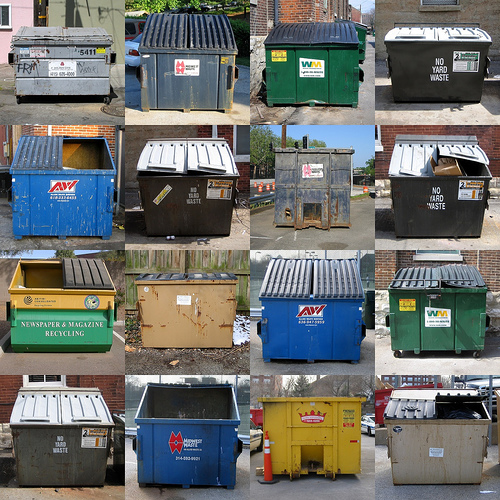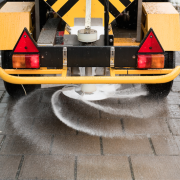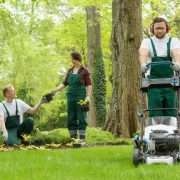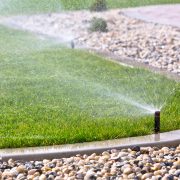
Waste and Material Storage
If rain falls into your dumpsters or on your raw materials, then it’s carrying some of that stuff with it as it drains away. A little good housekeeping and a few sheds or tin roofs can take care of that problem. Property managers should inspect dumpster regularly and only store chemicals outside with tight-fitting lids.
For more tips like these check out this handy brochure from the Bureau of Water Supply Protection at the MA Dept of Conservation and Recreation.

Parking Lots
Businesses, churches, hospitals, and other institutions can do a lot to reduce polluted runoff from their parking lots.One solution is to replace asphalt with modern “permeable” pavements that allow rain and melting snow to soak in rather than run off. Another is to design parking lots to drain into catch basins, filter strips, and stormwater ponds, rather than directly into the storm sewer system.
You can learn more about these techniques by reading the fact sheet below, prepared by the Pioneer Valley Planning Commission.

Snow and Ice Removal
When businesses, churches, and hospitals use road salt and de-icers, melting snow carries those chemicals into waterways. Businesses should store these chemicals carefully and apply them sparingly. When purchasing, read the labels on de-icing products and choose those that are not toxic to animals and plants.
Check out the Mass Department of Environmental Protection’s guidelines on where and how business and local governments should store their salt. Protect our waterways!

Outdoor Cleaning
Grounds crews should sweep sidewalks, loading docks, and parking lots and dispose of the trash and debris in the dumpster, rather than washing these areas with a hose. If outdoor washing is necessary, look for environmentally friendly, water-based cleaning products. Maintenance crews should rinse paint cans, brushes, buckets, or other cleaning materials in an indoor sink.
For a great example of operational procedures, check out the Town of Sudbury’s “Clean Water Best Practices” manual, below.

Landscaping Chemicals and Fertilizers
Groundskeepers should test soil and read the label before applying fertilizer. If they use too much fertilizer, the excess will just wash away in the next rain, polluting local waterways. Use fertilizers sparingly and sweep up driveways, sidewalks, and walkways.
Fertilizer may not even be necessary! According to experts, many businesses over-fertilize their landscaping. The University of Massachusetts has a handy guide for testing soil to determine if it can absorb any more nutrients. Also, our guidelines for maintaining a healthy and sustainable yard are applicable to your business greenery too!

Irrigation
Most businesses only need to water their landscaping once a week. It’s smart to put sprinklers on timers so they water early in the morning, and point them so that they don’t water the sidewalk or driveways. If your businesses has stormwater ponds, cisterns, or rain barrels that capture rain before it leaves your property, using that water on your landscaping often makes a lot of sense.
The Metropolitan Area Planning Council includes a chapter about business reuse of water in its guide Once is Not Enough: A Guide to Water Reuse in Massachusetts .
Also check out our guidelines for irrigation on a residential level.

Fleet Maintenance
Many institutions maintain fleets of trucks, buses, and other vehicles on site. Do this carefully to keep gasoline, oil, and soap suds out of storm drains and waterways. Vehicle maintenance should be done indoors, using drop cloths and drip pans. If there is a spill, clean it up promptly using absorbent sand and kitty litter.
The Massachusetts Office of Energy and Environmental Affairs has published a fact sheet on stormwater and related topics, like fleet maintenance, for municipal governments. Check them out below, it’s good advice for all businesses, churches, hospitals, and other institutions, too!




